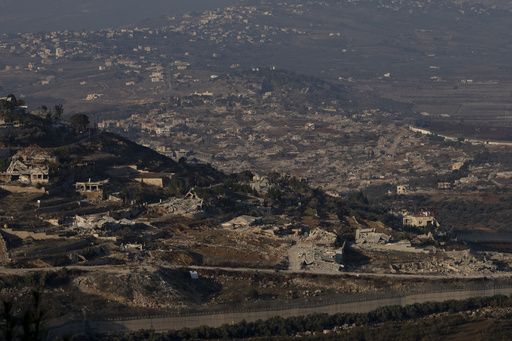
BEIRUT — On Tuesday, Israeli military forces executed a series of drone and artillery assaults in Lebanon, which included a targeted strike that local health officials confirmed resulted in the death of a shepherd. This incident further unsettled the fragile ceasefire established to conclude over a year of conflict with Hezbollah.
Israeli Prime Minister Benjamin Netanyahu reiterated his commitment to continue operations “with an iron fist” against what he perceives as Hezbollah violations of the truce. His defense minister cautioned that if the ceasefire were to fail, the Israeli military would not only focus on Hezbollah but also escalate its actions towards the Lebanese state, marking a significant escalation in Israel’s military strategy.
Since the ceasefire commenced last Wednesday, brokered by the United States and France for a duration of 60 days, it has been under constant strain due to near-daily Israeli airstrikes. However, the specifics of the alleged Hezbollah breaches that instigated these responses remain unclear.
On Monday, the ceasefire faced its most significant trial to date when Hezbollah launched two projectiles towards a contested border area, marking their first offensive since the truce began. They declared this act of aggression a “warning” against the Israeli strikes. In retaliation, Israel unleashed its most intense barrage of the preceding week, leading to the deaths of ten individuals.
On Tuesday, Israeli drone operations targeted four locations in southern Lebanon, including a strike that killed the shepherd in the Shebaa area, as reported by the National News Agency of Lebanon. The Health Ministry corroborated this account, noting that Shebaa lies within a region where Israeli forces have explicitly warned Lebanese citizens not to return due to ongoing military operations.
Additionally, Israeli forces conducted artillery shelling and gunfire in two other locations, further escalating the situation. With Tuesday’s events, the death toll from Israeli strikes since the initiation of the ceasefire has risen to at least 15.
The truce stipulates that Hezbollah is to withdraw its fighters, arms, and defensive structures from a substantial region in southern Lebanon by the conclusion of the initial 60-day period, relocating them north of the Litani River. Concurrently, Israeli forces are expected to retreat to their own side of the border.
Israeli Defense Minister Israel Katz emphasized that any breaches of this agreement would provoke a “maximum response and zero tolerance.” Addressing troops stationed on Israel’s northern border, he indicated that should hostilities resume, Israel’s military action would extend beyond the areas predominantly influenced by Hezbollah, implying that the Lebanese state itself would no longer be exempt from targeting.
This ceasefire has concluded 14 months of hostilities between Israel and Hezbollah, culminating in intensified Israeli air assaults since late September and a ground offensive that accounted for substantial casualties, including hundreds of Hezbollah fighters and civilians. Over 1.4 million individuals were displaced as a result of this conflict. Throughout this period, Israel refrained from targeting critical infrastructure or the Lebanese armed forces, who generally maintained a neutral stance.
Israel’s strategic objective has been to displace Hezbollah from the border, facilitating the return of numerous Israelis who were evacuated from northern areas amid escalating rocket attacks from Hezbollah, which were executed in solidarity with Hamas in Gaza.
“Presently, we are in a ceasefire — a ceasefire, not the conclusion of the war. Our clear objective is to restore residents and rehabilitate the north,” Netanyahu stated at the beginning of a government meeting on Tuesday.
“I want to emphasize our firm enforcement of this ceasefire, actively responding to any violations, regardless of their severity,” he added.
Lebanese officials have accused Israel of breaching the truce on numerous occasions through strikes, drone overflights, and demolition of homes. In its statements regarding these operations, Israel has cited “hostile” actions by Hezbollah that allegedly pose a “threat to Israeli civilians,” although the specifics of these threats are often left unspecified.
In a recent development, the U.S. military announced that Major General Jasper Jeffers and senior U.S. envoy Amos Hochstein will lead a U.S.-initiated committee aimed at overseeing the ceasefire and ensuring compliance. This committee also includes representatives from France, the UN peacekeeping mission in southern Lebanon known as UNIFIL, as well as Lebanon and Israel.
Hochstein was instrumental in facilitating the ceasefire agreement after over a year of diplomatic efforts and will serve in this role temporarily until a permanent civilian co-chair is appointed.
As part of the agreement, both the Lebanese army and UNIFIL will enhance their presence in southern Lebanon to prevent Hezbollah’s resurgence in the area.
In light of ongoing challenges, the financially strained Lebanese army, which benefits from U.S. support, announced a recruitment initiative on Tuesday. Currently, the army comprises about 80,000 personnel, with approximately 5,000 deployed in the southern region.
